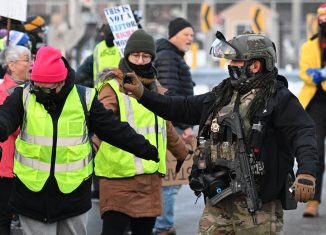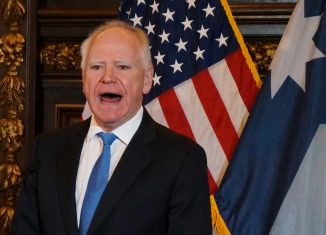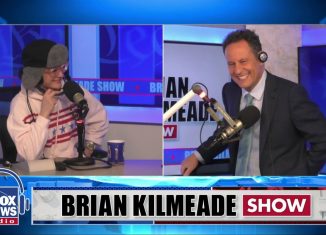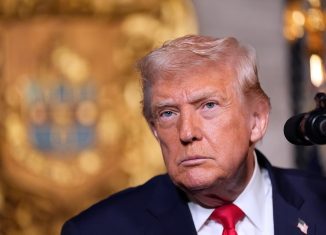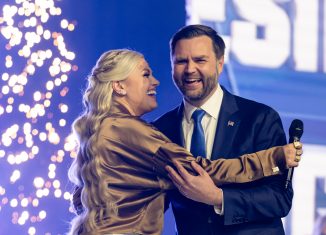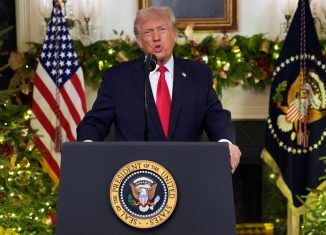
Ambassador John Bolton on President Trump pulling out of the INF (Intermediate-Range Nuclear Forces Treaty) with Russia Making American people safer
(Brian Kilmeade) What should the American people know about what we just did?
(Ambassador John Bolton) Well this is a very important step to keep the American people safe. As you just heard from Mike Pompeo in the clip you just ran. The Russians have been violating this treaty for well over a year. They’re developing a capability in ballistic missiles that can carry nuclear warheads in this intermediate range. The treaty was supposed to prevent. So as the defense minister of Poland said to me some weeks back you know the Russians have already withdrawn from the treaty by violating it and so we were in this anomalous situation where we were the only country in the world precluded by treaty from building intermediate range ballistic missiles. China we estimate maybe a third to a half of their existing ballistic missile force violates the IMF treaty of North Korea got Iran you’ve got other countries. Only the United States was precluded from protecting its people its forces and its allies around the world. So fundamentally although you’ll hear some hysterics from people who see arms control theologically this was a very important step. President Trump took to make the American people safer.
Listen here:
BRIAN KILMEADE, FOX NEWS ANCHOR: The President red flagged this awhile ago and Mike Pompeo, the Secretary of State, just made it official, within six months we’re totally out because of their multiple violations. That does not come to a surprise to National Security Advisor John Bolton who joins us right now from Washington. Welcome back John, great to hear from you.
JOHN BOLTON, NATIONAL SECURITY ADVISOR FOR U.S.: Glad to be with you, thanks for having me.
KILMEADE: Well first off, this was not a surprise to you. You guys were always on the same page with the state department. What should the American people know about what we just did?
BOLTON: Well this is a very important step to help keep the American people safe. You just heard from Mike Pompeo and the clip you just ran, the Russians have been violating this treaty for well over a year. They’re developing a capability in ballistic missiles that can carry nuclear warheads in this intermediate range that the treaty was supposed to prevent. So the defense minister of Poland said to me some weeks back, you know the Russians have all ready withdrawn from the treaty by violating it. And so we were in this anomalous situation where we were the only country in the world precluded by treaty from building intermediate range…
KILMEADE: Right.
BOLTON: …ballistic missiles. China, we estimate maybe a third to a half of their existing ballistic missile force violates the INF treaty. You’ve got North Korea, you’ve got Iran, you’ve got other countries, only the United States was precluded from protecting its people and its forces and its allies around the world. So, fundamentally although you’ll hear some hysterics from people who see arms control theologically. This was a very important step President Trump took to make the American people safer.
KILMEADE: If we move out of this, the question will be what do we move into? So, if the rules are gone, we have more money, we have a bigger arsenal, we have a bigger economy, we got more allies. This is not even the same Soviet Union that we beat in the 1980’s in the Cold War. So, what is the message to you and your NATO allies about what we focus on? It used to be Persian missiles in West Germany, what now?
BOLTON: Well, this is the important next time in Europe, as I said, the global theater is what America has to be concerned with because we’re essentially defending American interests everywhere.
KILMEADE: Understood.
BOLTON: I think it’s important to underline here that later today or early tomorrow, everyone of our NATO allies, everyone, will support the U.S. decision to withdraw from this treaty. So, we went through a long consolation process, we made the allies fully aware of all the Russian violations and the result is that the alliance will be unanimous in condemning the Russian violations and supporting our decision to get out. So, everybody in Europe all across the North Atlantic everybody has their eyes wide open to this as we think about what to do next. And I think one answer is to say to the Russians, we’re not going to be intimidated by your deployment of these weapons. This has left Russia further isolated and they’re really the ones who made a mistake by violating the treaty in the first place.
KILMEADE: All right lets – I want to get to Venezuela obviously but I do want to stay in this – stay with you for a second. They are working on alternative money payment channels to continue to this deal with Iran. So they continue payments to Iran to be able to trade with Iran. Not only are they not getting on board with us pulling out of the deal, they’re trying to work around us. What’s your response to that?
BOLTON: Well speaking of ciology(ph), this is the European Union they’re just so determined to show they can act independently. They’ve created a vehicle, it’s taken them close to a year to do it. It’s very unclear whether much will happen through this vehicle. So as a practical matter, I’m not sure it’s going to make any difference. The fact is that…
KILMEADE: They say it’s at an advance stage. They say it’s at an advance stage and they hope to announce something very soon.
BOLTON: Yes, this is like filing papers with a Secretary of State to create a new corporation. The papers look great and that’s the entire extent of what they’ve put together.
KILMEADE: All right, are you disappointed that our allies have not seen the wisdom of pulling out of a deal, you didn’t like that the President Obama administration loved?
BOLTON: Well, we’re still working on it. Look, I think the other parties to the Iran nuclear deal are increasingly concerned about Iran’s terrorist activities, including attacks in Europe itself. They’re deeply concerned about Iran’s ballistic missile activities which are not covered by the Iran deal. But which everybody knows are intended to help get Iran to a place where it has delivery systems for nuclear weapons. So, this was part of the criticism of the Obama deal from the start, that it limited really only a part of the nuclear weapons program. Iran remains a threat, there’s no evidence they’ve made a strategic decision not to continue getting deliverable nuclear weapons.
KILMEADE: Defense – the DNI director Dan Coats as well as Christopher Wray and others, went to Capitol Hill to speak in front of Arm Services Committee to talk about the state of American and our greatest enemies and we all agree it’s China, Russia, Iran, and North Korea. But here’s a listen to some of what the intelligence people have said as opposed to what the President has said.
(BEGIN AUDIO CLIPS)
DONALD TRUMP, PRESIDENT OF THE U.S.: We have one against ISIS, we’ve beaten them and we’ve beaten them badly.
UNIDENTIED MALE: ISIS is intent on resurging and still commands thousands of fighters in Iraq and Syria.
TRUMP: Chairman Kim, we have a great chemistry and we’re well on our way, you know we signed an agreement that said we will begin the immediate denuclearization.
UNIDENTIFIED MALE: North Korea will seek to retain its WMD capabilities and is unlikely to completely give up its nuclear weapons and production capabilities.
TRUMP: I have President Putin, he just said it’s not Russia. I will say this, I don’t see any reason why it would be.
UNIDENTIFIED MALE: Not only have the Russians continued to do it in 2018 but we’ve seen indication that they’re continuing to adapt their model.
(END AUDIO CLIP)
KILMEADE: So do you, as national security advisor John Bolton, are you concerned that the administration and officials seem to be on different pages or like the President do you think they were taken out of context?
BOLTON: Well, you know I sat in a discussion yesterday between President Trump and Dan Coats, the director of national intelligence, Gina Haspel, the director of the CIA, where they said look Mr. President these quotes were taken out of context, if you looked at everything we said which was carefully cleared within the intelligence community that we were supporting your position. So, the President put out a tweet on it yesterday and I think he’s happy with his intelligence community leadership and it’s another example of the press trying to find visions and drive wedges between the President and his top advisors. I can tell you that’s a common phenomenon on the press, they’ve tried to do it to me too, so I felt a little sympathy yesterday for the intelligence community leaders.
KILMEADE: But you feel as though they left on the same page?
BOLTON: Yes, I thought they had a very productive discussion and we talked about all of these issues, North Korea, Iran, ISIS. I mean I’ll just give you one example, what the President has been talking about consistently is that we are defeating the ISIS territorial caliphate. We’re down to it’s a couple of square miles left in Syria and we’ll have it finished off in the very near future. That’s not to say that the ISIS threat of terrorists acts around the world doesn’t continue and something the President is very concerned about. He’s not going to allow an attack on the American homeland but destroying the territorial caliphate is what President Obama started to do and it took President Trump to finish. That’s what he’s been talking about.
KILMEADE: OK, where are we staying with Syria? Are we staying? The Kurds have reported that there’s no sign that we’re leaving yet. What’s the order to the Pentagon? Where does that stand?
BOLTON: No, the President’s decided that U.S. ground forces are going to be withdrawn from Northeastern Syria and what we’re working on is negotiations with the Turks with their allies, with everybody involved to try and maintain stability in that area after we leave and to make sure there’s no resurgence of ISIS. And I think the President has been clear on this too, there’s not been a change in his policy, we’re simply trying to elaborate on his objective of getting people out as quickly as possible but to do it in a way that preserves the objectives we went in for which is to stop ISIS terrorism.
KILMEADE: Are you upset that the Senate and Mitch McConnell colluded as having sending a message that we do not want you to leave Syria President Trump and that’s resolution that they’re passing that has no teeth but they want to show that there’s a bipartisan push that we should not be leaving. Very rarely do democrats and republicans agree on that outside Rand Paul. Does the President hear that and understand the concern?
BOLTON: Yes, actually we’re not totally leaving Syria, at least not completely in the what is called the “aut tashan exclusion zone.” We’ll be keeping troops there until the President makes another decision to withdraw and I think people who have come and met with the President, members of the House and Senate and others we’ve been talking to have an understanding of this and I think again the differences there are much less than the press makes them out to be.
KILMEADE: Maybe you see – can you bar Rand Paul from the White House so we have a sober foreign policy not one from an eye doctor?
BOLTON: My friend Rand Paul.
KILMEADE: OK, that was very diplomatic of you. Afghanistan, we know you have the right person Ambassador Khalilzad talking with the Taliban but it doesn’t look the like government is in on this, the current Afghan government is in on this. Ambassador Ryan Crocker, I think he’s a person you respect for his work in Iraq and Afghanistan, said this, cut 38.
(BEGIN AUDIO CLIP)
AMBASSADOR RYAN CROCKER: The fact that we are holding these talks without the Afghan government in the room is a huge dangerous concession for us to the Taliban. That has always been their position. We’ll talk to you Americans, we’re not going to talk to the puppet regime you’ve installed. And we’ve conceded that point, which delegitimizes the Afghan government. So, if this is a course we are going to continue on, this very much is a surrender negotiation.
(END VIDEO CLIP)
KILMEADE: Do you understand his concern? Do you echo it?
BOLTON: Yes, Khalilzad understands Afghanistan as well as anybody on the American team being an Afghan American himself. And just in the past few days he was in Kabul speaking with the President of Afghanistan, other senior Afghan officials because obviously to conduct this negotiation to a successful conclusion we are going to have to have the Taliban sit down with the Afghan government. Nobody needs to tell Khalilzad that or Mike Pompeo or anyone else, so we appreciate the advice, we understand the circumstances that we face today are somewhat different than those that other officials who have dealt with Afghanistan faced back in their day and we’re trying to address the circumstances that we face today.
KILMEADE: But they’re not unfounded, I mean there is a concern that the Taliban’s going to do what they did when the Russians left, the Soviets left and that’s take the country over.
BOLTON: Well that’s what Khalilzad is negotiating with them about, to prevent that and to maintain an American presence there for counter terrorism purposes.
KILMEADE: Here is, well yes, you understand people’s concerns after 17 years, the way you get out has everything to do with what happens?
BOLTON: Right, the President campaigned on this in 2016 and I think he believes as he has done in so many other areas, he’s fulfilling the promises that he made.
KILMEADE: Let’s go to Venezuela, you’ve been all over this. Thirty-five-year-old Guaido is the man that we believe should be running the country until the next election. Maduro, we were told – we’re telling him to go, word is that a Russian plane has landed and they are loading it up with Venezuelan gold and there was a raid on Guaido’s home, rattling his grandmother and his wife. What is America prepared to do to stop both of these things?
BOLTON: Well as the President has said repeatedly, all options are on the table. Look, we imposed on Venezuela, sweeping sanctions on Monday against the state owned oil monopoly. They didn’t see it coming, it will have devastating effect on revenue’s for the Maduro clic(ph). We have frozen substantial gold assets in vaults and banks outside of Venezuela. There are a lot of reports on what they’re trying to do with their gold, we have made it clear. I tweeted a couple days ago, you can only buy gold or any other asset legitimately from its real owner and the Maduro mafia doesn’t own that gold, the interim president and his government Juan Guaido own that gold. So anybody who buys it is buying it from a fraudulent seller and we’re making that clear. But even under the worst of circumstances, when they sell the gold once, they can’t sell it again. So, the pressures on and we’re going to do what we can to effect a peaceful transfer of power to the legitimate democratically supported government.
KILMEADE: How do we support a thirty-five-year-old who doesn’t have control of the army?
BOLTON: Well, the part of what the opposition, what the interim president, what the national assembly are doing now is talking to the army. We’d like to see the army, we think overwhelmingly the enlisted ranks 80 percent perhaps, almost all the junior officers really do support a democratic government. They don’t want to see this devolve into violence, military on military, military against civilians. And so that’s what we’re working on and we’re going to increase the international political and economic pressure to convince the military to do that.
KILMEADE: We’d love to get Cuba, the Russians, Iran, and China out of our hemisphere, make it happen Ambassador.
BOLTON: We’re working on it.
KILMEADE: You got it, thanks so much for your time. John Bolton, National Security Advisor, thanks so much, appreciate John.
BOLTON: Thank you Brian.


